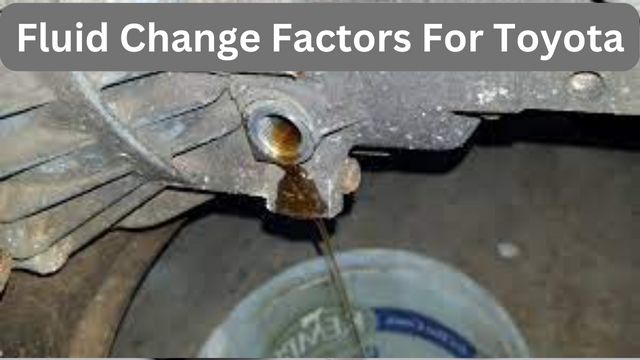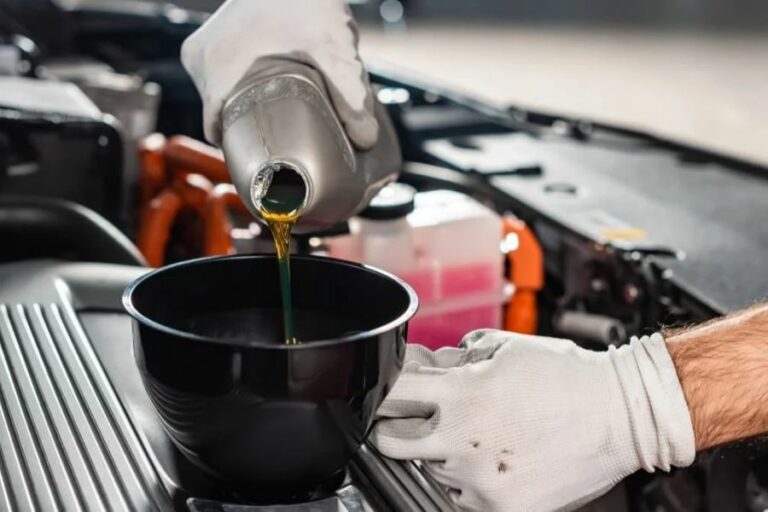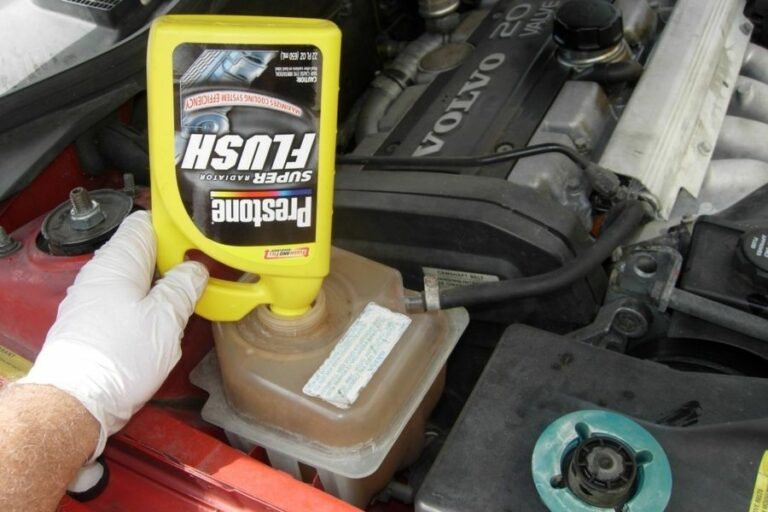How Often To Change Brake Fluid Toyota?
Safety starts with reliable brakes, so ensure your vehicle’s braking system is well-maintained for optimal stopping power. Accordingly, the fundamental ingredient is the brake fluid, which transfers pressure throughout the hydraulic system. However, brake fluid degrades over time as it absorbs environmental moisture. Regular replacement of the fluid increases the efficiency of maintaining pressure.
Every Toyota owner worries about how often to change brake fluid oil Toyota? As a general guideline, Toyota recommends changing the brake fluid every two years or 20,000 miles, whichever comes first. However, driving styles and conditions can accelerate degradation for specific drivers. Accordingly, a vehicle’s age, weather, and braking contribute to deterioration in fluid quality.
Here’s an in-depth look at how brake fluid keeps the brakes working and why it’s important to replace it regularly.
What happens if You Don’t Change the Brake Fluid?

Brake fluid is a hygroscopic fluid, which means that it absorbs moisture from the air. Over time, this moisture can lower the boiling point of the brake fluid and cause corrosion to the brake system components.
If you don’t change the brake fluid, then the following can happens:
- Reduced braking performance
- Brake fade
- Corrosion
You may also read Can Having Low Radiator Fluid Damage Your Brakes
Fluid Change Factors For Toyota

You can prevent brake issues and improve the performance of your brakes by understanding how often to change brake fluid Toyota. However, the frequency may vary depending on driving habits and conditions.
Brake Fluid Degradation Over Time
Moisture and contaminants cause the brake fluid to degrade over time, so it needs to be changed regularly. Possible effects and reasons:
Absorbs Moisture Over Time
The brake fluid will slowly deteriorate when exposed to moisture from the air via the brake lines, even when the brakes are not in use.
Contaminants Degrade Fluid
A brake fluid reservoir without proper maintenance can become contaminated with dirt, debris, and other impurities, reducing its performance and quality.
Impacts on Performance
Brake systems with degraded brake fluid are prone to vapor lock at lower temperatures, reducing stopping ability. Moreover, moisture in the brake system can cause corrosion and reduce the lifespan of the brake system components.
Driving Conditions Demand More Changes
Brake fluid Toyota will degrade faster if you’re driving under harsh weather conditions like moisture, salt, or dust, you’re off-roading, or you’re in stop-and-go traffic a lot. Therefore, you need to replace your brake fluid regularly because:
Moisture
Certain weather conditions, such as heavy rains or high humidity, can increase the presence of moisture in the air, which can cause brake fluid degradation more rapidly.
Salt
A corrosive road treatment for snow or ice can expose the brake system to corrosive elements, accelerating fluid degradation and increasing brake failure risk.
Dust
Particulate matter is more likely to enter the brake fluid when exposed to dusty environments, which could compromise the integrity of the fluid.
Off-Roading
In off-road driving, challenging terrains and increased braking demands can generate heat and strain brake fluid, necessitating more frequent changes.
Heavy Traffic and Stop-and-Go Driving
During periods of constant and heavy braking, such as stopping and going in stop-and-go traffic, brake fluid can deteriorate more quickly, requiring frequent replacement.
Inspect Fluid Level and Color Regularly
Inspecting the oil level and its color closely during every oil change is essential to identify any leaks immediately.
- Darkened fluid can lead to contamination or breakdown.
- Insufficient fluid can compromise braking.
Pay Attention to Pedal Feel and Brake Performance
Toyota’s pedal feel and braking power are two good indicators of potential problems before they become serious.
Pedal Feel
A steadily increasing brake pedal travel or a soft, low pedal may indicate air in the lines or a low fluid level, and the brake system needs inspection.
Braking Power
Any deterioration in braking power, such as increased stopping distance, is a safety concern, and a mechanic should evaluate the system immediately for safety since timely repair contributes significantly to protecting a vehicle and its passengers.
Routine maintenance
You may need to change the brake fluid Toyota more frequently if you drive at high speeds, idle for a long period, or drive on hills, according to the Toyota owner’s manual.
- Owner’s manual recommendations rely on extensive testing.
- Avoid costly repairs by strictly following the manual schedule.
- Fluid changes might be necessary earlier in severe conditions.
Fluid Debris Check
A thorough inspection of the brake fluid provides insight into the hydraulic system. Remember, when the brake fluid is contaminated or unusually dark, you can detect rust, worn rubber, and foreign particles.
- Particulates, like rust, rubber, and rust, give clues about internal wear.
- Unusually dark fluid indicates breakdown from moisture contamination.
- Fluid inspection reveals the extent of contamination in hydraulic systems.
- Identify the source of metal shavings and fix it.
- If contaminants exceed manufacturer specifications, flushing is advisable.
Symptoms That Tell Your Brake Fluid Needs Changing
Here are some symptoms that tell that how often does brake fluid need to be changed in Toyota. Regular brake fluid maintenance is essential to ensure safe and effective braking. Observe signs of brake fluid change, such as a soft pedal, reduced braking power, strange noises, an illuminated ABS warning light, a burning smell, or changes in fluid appearance.
If you found any of these symptoms in your car, then your Toyota brake fluid need to change.
1. Soft Pedal and Reduced Braking Power
Soft pedals or reduced braking power can be alarming signs that compromise your safety on the road. A brake fluid Toyota change is the best way to restore optimal braking performance.
Effects of Low Brake Fluid Levels
Low brake fluid levels can cause your brake pedal to feel soft and spongy and may sink closer to the floor when you apply pressure. In this case, the hydraulic pressure required for effective braking decreases.
Also, when the brake fluid is low, the brake system cannot generate enough pressure to engage the brake pads fully, resulting in reduced braking power.
Restoring Proper Pedal Feel
You need to replace the brake fluid reservoir with the correct fluid type recommended by the vehicle manufacturer to restore proper pedal feel and improve braking performance.
2. Increased Stopping Distances
A long distance to stop a Toyota is likely due to brake problems, and several possible causes can affect how often to change the brake fluid Toyota. Among them are:
- Using contaminated brake fluid restricts rotor contact.
- Brake pads with less friction material contact rotors less.
- Grooved or warped rotors reduce braking power.
- Compressible air bubbles in brake lines transfer force instead.
- A leak reduces hydraulic pressure at the wheels.
- Absorption of moisture in old brake fluid lowers the boiling point.
3. Squealing or Grinding Noises
When your brakes are making unpleasant noises, it is a sign that the hydraulic system is malfunctioning.
- Glazing and heat damage on pads from poor contact causes squealing.
- Uneven pad deposits on rotors lead to thickness variations and vibrations.
- Lack of lubrication between the pad backplate and caliper pins can cause a squeak.
- Contaminated brake fluid reduces pressure on calipers.
- Pads cannot fully contact rotors, causing a metallic grinding sound.
- Worn pads with minimal friction material left cause metal-on-metal grinding.
4. Iluminated ABS Warning Light
The ABS warning light is a warning sign of potential brake fluid problems. When you notice this light illuminated on your dashboard, it indicates an issue with the brake fluid in your vehicle. In this case, you must take action promptly, which may mean changing your brake fluid.
Fluid Irregularities
Contamination or insufficient levels can result in inconsistencies in Toyota fluid pressure and viscosity, affecting ABS activation.
Importance of Maintenance
Maintaining proper hydraulic pressure and performance during regular fluid changes is the key to preventing ABS malfunctions.
Don’t Delay Repairs
A failing ABS light is a safety issue and, if left unattended, can be hazardous. Thus, a fluid flush may be required to restore system performance to its normal state.
5. Burning Smell from Overheated Brakes
You may have noticed that your brakes emit an unpleasant burning odor due to overheating. Here are a few possible reasons for this:
- At lower temperatures, contaminated fluid turns into vapor.
- Moisture-saturated fluid is unable to absorb brake heat.
- Repeated braking causes overheating of the brake pads and rotors.
- Fluid issues prevent even contact between brake pads and rotors.
6. Changes in Brake Fluid Appearance
Monitoring the appearance of your brake fluid is important for identifying potential issues. Moreover, if you notice color changes or see visible particles floating in the fluid, it may indicate contamination.
Color Changes
There is no problem with clear fluid to light yellow, but dark, cloudy, or murky fluid indicates contamination.
Visible Particles
There is a risk that floating debris can interfere with the braking system’s performance due to component wear.
Prompt Replacement
There may be a need for a complete flush and replacement of the fluid if you notice any changes in the appearance of the fluid and want to get rid of it.
Final Talk about when to change brake fluid of Toyota:
Understanding how often to change brake fluid Toyota is necessary for maintaining braking efficiency and preventing accidents. Hence, green brake fluid indicates copper corrosion and moisture contamination and requires immediate attention, while clear to light yellow fluid is normal. Remember that if left unchecked, green fluid will accelerate the wear of internal brake components.
However, severe use or harsh conditions may necessitate more frequent changes. While replacing degraded brake fluid adds maintenance cost, it pales in comparison to the expense and safety risk of damaged brakes. Thus, with proactive fluid replacement Toyota and system flushing, you can confidently rely on your brakes working properly when needed most.



![Is Penetrating Oil Flammable [High flammability Reason Answered]](https://carfluidpro.com/wp-content/uploads/Is-Penetrating-Oil-Flammable-High-flammability-Reason-Answered-768x512.jpg)


